Dachshunds were originally bred to be small game hunters. They are confident, muscular dogs that have no qualms with chasing what they want.
Although this “cute”, lively breed is popular, there have been questions as to potential issues with aggression.
Dachshunds have a long history of hunting badgers, so they are genetically predisposed to aggression.
Badgers are very mean, and were often encountered by a Dachshund without the hunter present (underground in their burrow or alone in the woods). Therefore, to be good badger hunting dogs, Dachshunds were bred to think quickly, and take independent action, to subdue the prey.
Other environmental factors will contribute to how aggressive any dog is, but unfortunately Dachshunds are more prone to displaying the characteristics.
Dachshunds may display aggressive traits, but some of this can be controlled at an early age with proper training.
The Dachshund is an inherently dominant breed, but you can generally get any sign of aggression under control at a young age by using positive reinforcement methods of training.
Some experts suggest keeping any sort of “chasing” games to a minimum with a Dachshund puppy, as they can trigger natural aggression.
This is especially important to take into consideration when introducing your Dachshund to children.
Are Dachshunds Aggressive Dogs?
The simple answer is yes.
According to a study published in the December 2008 issue of the Journal of Applied Animal Behaviour Science, and conducted by researchers at the School of Veterinary Medicine, University of Pennsylvania, “Dachshunds scored higher than average for aggression directed toward both humans and dogs.” (Source: Duffya, Hsub, Serpella)
However, DogBite.org compiles a list of fatalities caused by dog bites each year and in their 2018 summary Dachshunds did not appear anywhere in the report. The breed was also not called out as being a source of fatal dog bites during the 14-year period between 2005 and 2018.
While some Dachshunds can be aggressive, they don’t show up on the list of deaths due to dog bites.
In 2018, the news reported that a woman was mauled and killed by “a pack of Dachshunds” in Oklahoma. However, despite the media’s insistence, it was not proven these were Dachshunds.
It was confirmed that the 7 dogs involved were mix-breed all under 40 lbs.
The technician responsible for euthanizing the animals said 6 of them were Dachshund-terrier mixes but the investigating Sheriff said, “the breed of the dogs could not be determined and that they are not Dachshunds.”
A veterinarian involved in the case said, “The dogs actually appeared to be pit bulls, with four pit bull-mix puppies and one female who looked like an Australian shepherd mixed with ‘something with short legs’.” (Source)
The bottom line is that, yes, Dachshunds have been shown to be a dog breed that is more aggressive than average.
However, none of their bites have been involved in a fatality and some cases of aggression attributed to the breed could be a case of mistaken identity.
What Causes a Dachshund to Be Aggressive?
Just because Dachshunds are genetically predisposed to aggression doesn’t mean every one of them will be or that genetics is the only factor that can contribute to this negative behavior.
There could be several other external factors contributing to your pup’s aggressive tendencies.
There are several reasons Dachshunds may be aggressive, which include both external factors and genetics.
These could include:
Fear
Any dog breed who is subjected to a fearful or threatening situation is much more likely to display aggression.
When a dog feels threatened, fear hormones are released in their body and they start to develop a “fight or flight” attitude. A dog in this state will either flee or use aggression to “fight off” the threat.
Fearful situations can include:
- Being confronted by dogs or people that are much larger than them
- Having their personal space continually invaded despite their body language saying they want to be left alone (like looking sideways showing the whites of their eyes, trying to move away or hide, licking its lips, yawning, etc.)
- Strangers invading their space
- Other dogs that seem threatening or are showing aggressive body language toward them
Resource guarding
This breed was bred to hunt and kill their prey. And what do you do when you have fresh kill? Protect it for yourself, of course!
Dachshund’s like to make sure they have full control over whatever it is they are protecting, whether it’s their human, food, or toy.
They may become upset if a person or other animal attempts to take their prized possession.
Anxiety or boredom
Anxiety, stress and boredom can cause any dog to act out, but Dachshunds may become aggressive rather than destructive like other breeds if not given a proper outlet.
Dachshunds, similar to other dogs, may get aggressive if they are bored or anxious.
A well-exercised and entertained Dachshund is much less likely to display any sort of aggression.
Social aggression
Some Dachshunds may react aggressively toward other dogs to determine the hierarchy.
Socializing your pup properly at a young age can help avoid this situation entirely.
Predatory aggression
Since Dachshunds are bred hunters, they tend to exhibit predatory behavior, which translates to chasing small animals and wildlife.
Dachshunds are bred to hunt, so they may display aggression when their prey drive is sitmulated.
This behavior can shift to humans if you’re playing a game but your dog becomes over-excited and their prey drive kicks in.
Likewise, this can happen if a small child runs, or moves by them, fast. This rapid and erratic movement can stimulate their prey drive.
Bites occur frequently in these situations.
Do You Know What Aggression Looks Like?
Sometimes, aggression in Dachshunds is misunderstood because not everyone understands a dog’s body language.
Sometimes, a Dachshund can just be overly excited or playing and it’s interpreted as aggressive behavior.
Dogs that bark often are not necessarily aggressive.
For example, some people think a dog may be acting aggressive if they chase another dog at a dog park and bark a lot. However, that may just be their play style.
Alternately, some fail to recognize signs of aggression, instead just playing it off “acting tough” or viewing it as harmless due to their dog’s small stature.
They key to identifying aggression is to know how to recognize aggressive body language.
So, what does dog aggression actually look like?
Most people picture aggression as a dog acting outward towards other dogs or people.
Signs of outward aggression includes, lunging, direct eye contact, posturing (appear rigid and stand in a stiff-legged stance), and snarling or growling.
Dogs often display aggression before acting on it.
There is also a more subtle aggression where a dog shows signs that they want the thing they fear to move far away.
This fear aggression can appear as if a dog is being submissive – holding their ears back, avoiding eye contact, lowering their head and body, and trying to move away.
If either of these signs of aggression are ignored, or the stressor is not removed, the behavior can escalate to nipping or attempting to bite.
What Can I Do About My Dachshund’s Aggressive Behavior?
If you’re noticing some seemingly aggressive behavior coming from your Dachshund, whether they are a puppy or adult, it’s important to pinpoint a possible cause.
To determine the cause, start by making the following observations.
- Is your Dachshund only aggressive in specific situations?
- What is your Dachshund being aggressive toward, and how frequently?
- Could your Dachshund be displaying aggression out of fear?
- Is your dog potentially acting out because they are bored or anxious?
- Does your Dachshund seem to be guarding something or someone?
If you have a new Dachshund puppy at home, it’s imperative to start socializing them as soon as possible.
Teaching your pup that humans and other pets don’t pose a threat is incredibly important.
It’s essential to teach your puppy that other dogs and humans aren’t threats.
The best way to train your Dachshund to accept strangers is through kindness and positive reinforcement training.
A Dachshund’s aggression is easily triggered as a defense mechanism, so minimizing fear at an early age is absolutely crucial.
7 Tips for Managing Your Dachshund’s Aggression
Other tips for managing or treating your Dachshund’s aggression include:
- Encourage good behavior through positive reinforcement training.
- Discouraging situations that could cause your Dachshund to become fearful, such as putting them into a crowded room with people when you know your pup isn’t fond of humans.
- Determine what is causing your dog’s aggression, then focus on changing that particular circumstance if possible. It could be a noise, person, other pets or environmental factors.
- Keep your Dachshund physically exercised with daily walks, adventures and play time.
- Offer your Dachshund mentally stimulating activities where they won’t have to fight for control, such as treat puzzles. Avoid playing tug or chase games that simulate the act of hunting.
- Talk to your veterinarian to rule out potential physical or cognitive health concerns. Even something like pain and neurological issues can cause any breed of dog to act out of frustration. Further testing or medication may be necessary.
- Never physically punish your Dachshund. This will only exacerbate fear and aggression.
If you’ve been attempting to curb your Dachshund’s aggression without success, it may be time to seek help from a professionally certified dog trainer.
If you do decide to go that route, be sure to choose a trainer who uses positive reinforcement methods of training. Aversive training tools such as shock or prong collars can cause even further aggression.
A dog trainer is a great resource for an aggressive Dachshund.
If training is not working, or if you believe there’s a more serious issue at hand, talk to your veterinarian to rule out any medical causes (actually, a good trainer may suggest this) and get their advice.
Don’t Let Their Tendency for Aggression Scare You
Dachshund may be more prone to aggression than some other breeds.
However, many Dachshunds don’t have significant issues with aggression.
In most of those that do, aggression can be easy to recognize, avoid, and treat with proper training.
Let’s not forget that Dachshunds are adventurous, incredibly clever, amazingly versatile dogs.
They can be excellent family dogs, can quickly become your best friend, make great travel companions, and the breed excels at obedience and field work.
With consistent training, love, and attention, these dogs can be courageous, loyal companions.

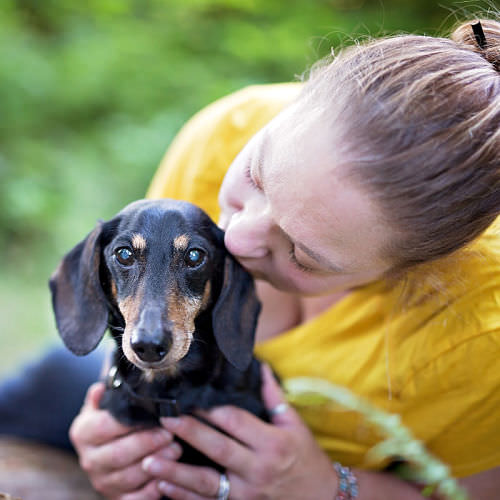
About the Author: Through her 17 years of owning and caring for Dachshunds, and almost 10 years researching and writing about them, JW has become a respected expert in the Dachshund community. Read more about her here.

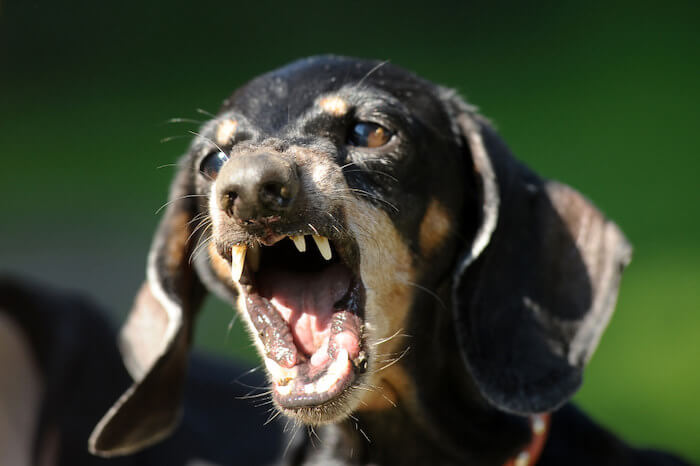
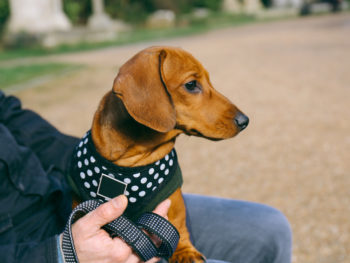
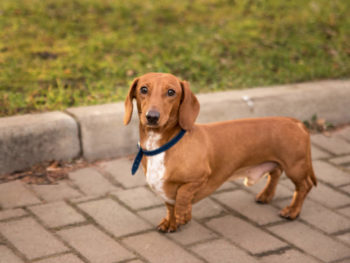

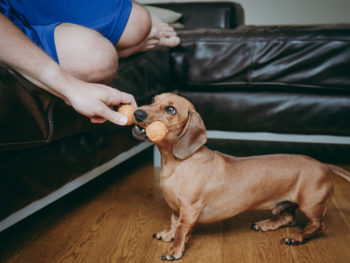
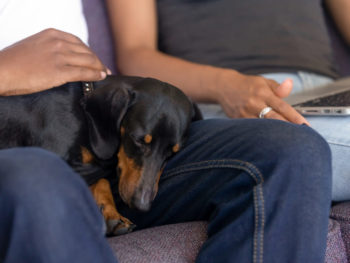
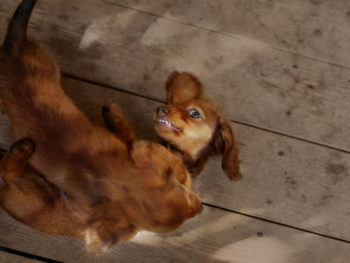
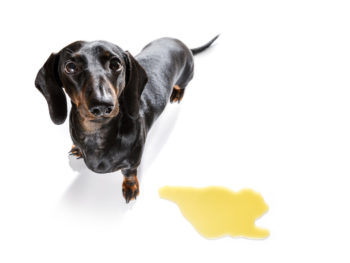
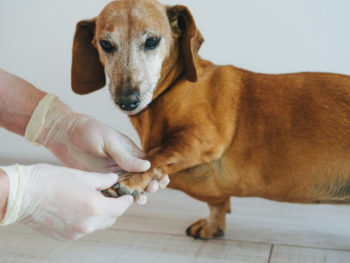
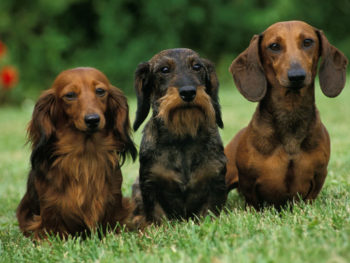
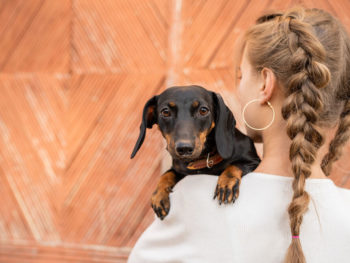


 What is the Dachshund Life Expectancy?
What is the Dachshund Life Expectancy?


